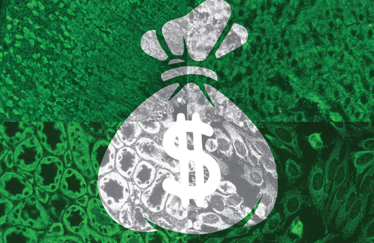Cutting the Cost of Antibodies
By eliminating protein A, researchers aim to deliver continuous processing at a fraction of the cost of conventional techniques
Looking to reduce the costs of biopharmaceutical production, researchers from the Austrian Center of Industrial Biotechnology and the University of Natural Resources and Life Sciences, Vienna, have developed a continuous purification method for recombinant antibodies from clarified CHO cultures (1). The team converted a two-stage batch precipitation-based antibody capture step to continuous mode using continuous tubular reactors. There is no protein A capture step; instead, the precipitation process uses calcium chloride and ethanol, which are inexpensive.

“In essence it is a continuous precipitation,” says Alois Jungbauer, one of the authors of the study, “but it is also very adaptable and could be a platform process. For instance, you could use it to replace certain steps in existing processes or go for a fully continuous sequence, and it can be applied to different antibodies. Recently, we’ve started a new project where we’ll be working with pharmaceutical companies to test it at full scale.”
Jungbauer explains that the inspiration for this method grew over 10 or 15 years: “It was clear to me that a fully continuous process would be optimum for manufacturing, for both biopharma and other pharmaceutical molecules. We’ve applied the principles to antibody purification, but it could also be extended to other products such as recombinant proteins or viruses.”
However, getting the biopharma industry to embrace continuous manufacturing has been a challenge. It’s only in the past four years that attitudes have begun to change. When Jungbauer and his team first started investigating continuous processing, they hit a dead end. “The field was not ready for continuous manufacturing and all of my colleagues from the pharma industry told me that this technology will not be used in industry and that it is not relevant. But now things are changing,” he adds.
The researchers believe that their continuous principles can compete with conventional protein A capture steps in terms of yield and speed, and they’ve now done studies with several antibodies using feedstock from pharmaceutical companies. “Protein A is still the workhorse in the biopharma industry for antibody manufacturing,” says Jungbauer. “It works very well and it is a complete, mature technology. It is the benchmark that any new technology has to beat. But at the end of the day, the question is: can you use Protein A to produce antibodies at an extremely low price? In 10 or 15 years, antibodies may become a large-scale commodity. At the moment, only a small number of patients can benefit from these medicines.”
Continuous processes will never be suitable for some products, such as those where only 1 to 10 kg are produced per year. Jungbauer envisions his work being applied for products produced on a larger scale. Currently, the team are working with pharma companies and testing different options to fine-tune the process, with the aim of bringing production costs down to less than $10 per gram of antibody.
- N. Hammerschmidt et al., “Continuous Precipitation of IgG from CHO Cell Culture Supernatant in a Tubular Reactor,” Biotechnology Journal, DOI: 10.1002/biot.201400608 (2015).

Making great scientific magazines isn’t just about delivering knowledge and high quality content; it’s also about packaging these in the right words to ensure that someone is truly inspired by a topic. My passion is ensuring that our authors’ expertise is presented as a seamless and enjoyable reading experience, whether in print, in digital or on social media. I’ve spent fourteen years writing and editing features for scientific and manufacturing publications, and in making this content engaging and accessible without sacrificing its scientific integrity. There is nothing better than a magazine with great content that feels great to read.



















